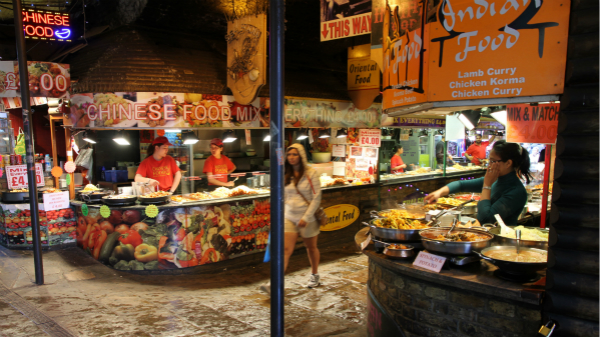(单词翻译:单击)
In an alleyway in London’s Camden Market, a woman in ripped black jeans and fingerless gloves fiddles with an iPad screen. Like most shopkeepers in this area, Emma Peonia usually sells clothes to tattooed youngsters paying with debit cards or cash but, for the first time, she is using a Chinese payments app to sell an Iron Maiden T-shirt.
在伦敦卡姆登市场(Camden Market,见文首照片)的一条巷子里,一名身着黑色破洞牛仔裤、手戴露指手套的女性在iPad屏幕上不停摆弄。和这里的大多数店主一样,埃玛?皮奥尼亚(Emma Peonia)通常把衣服卖给文身的年轻人,他们用借记卡或者现金支付。但现在,她第一次用一款中国支付应用来卖一件Iron Maiden乐队T恤衫。
“My boss thought it would be useful — she has just created a new website,” she says. “She wants to sell more to Chinese tourists.”
“我的老板觉得这会派上用场——她刚刚建了一个新网站。”皮奥尼亚说,“她想把更多商品卖给中国游客。”
WeChat, the popular Chinese messaging app owned by technology group Tencent, launched its payment service, WeChat Pay, in the UK on Wednesday. It is hoping that more shops like Ms Peonia’s will use it to target Chinese consumers, who last year spent £513m in the UK, according to Visit Britain, the tourism body.
中国科技集团腾讯旗下广受欢迎的消息应用微信(WeChat)本周三在英国推出了微信支付(WeChat Pay)服务。微信希望有更多店铺能像皮奥尼亚的店铺那样,使用微信支付来吸引中国消费者。根据旅游机构Visit Britain的统计,去年中国消费者在英国花费了5.13亿英镑。
As part of a modernisation push by its owners, Camden Market will ask more than 1,000 shops and restaurants to sign up to the app over the next four months, so that people with Chinese bank accounts linked to WeChat can shop in the market using their smartphones.
卡姆登市场将要求逾1000家商店和餐厅在接下来4个月里与微信签订合作协议,这样微信上绑定了中国的银行账户的人就能使用智能手机在卡姆登市场购物。这是卡姆登市场的所有者推动该市场现代化的一部分。
The idea is to replicate a system that Alipay, the rival Chinese payment app, has already implemented in the Harrods and Selfridges department stores. “In terms of the Chinese market it just offers a very good opportunity to us,” said Ceri Davies, operations director at Camden Market. “They’re currently super attracted by the likes of Selfridges and Harrods and the more ways there are of paying, the better.”
这是为了复制微信支付的对手支付宝(Alipay)在哈罗德百货(Harrods)和塞尔福里奇百货(Selfridges)铺设的支付系统。“在中国消费者市场方面,这给了我们绝佳的机会。”卡姆登市场的运营总监凯里?戴维斯(Ceri Davies)说,“他们现在很受像塞尔福里奇百货和哈罗德百货这样的购物场所吸引,支付方式越多越好。”
Tencent has already rolled out its payment platform — known in China as WeixinPay — around the world but this is its first foray into the UK. It is mainly targeting Chinese tourists, who can use their phones to pay while on holiday.
腾讯已经在全球各地推广其支付平台微信支付,但这是其首次进军英国。微信支付在英国主要面向中国游客,这样他们就可以在度假时使用手机支付。
It launched its payments system a decade after Alipay — which is run by Ant financial, an affiliate of Tencent’s biggest rival, Alibaba — but has since taken a 37 per cent slice of China’s market. The WeChat messaging app is ubiquitous in the country and has 980m monthly active users around the world. Users outside the home markets are mainly overseas Chinese or those with business or other connections in the mainland, for whom it is often the only way to communicate.
腾讯推出微信支付的时间要比支付宝晚10年,但自推出以来微信支付已占据中国市场37%的份额。支付宝的运营者则是腾讯最大的竞争对手之一阿里巴巴(Alibaba)旗下的关联公司蚂蚁金服(Ant financial)。作为一款消息应用,微信在国内得到广泛使用,其在世界范围内的月度活跃用户数量达到9.8亿。中国市场以外的微信用户主要是海外的中国人,以及与中国内地有商业或其他往来的人士。对后者而言,微信通常是与内地联系的唯一方式。
“Our primary focus is to better serve Chinese outbound tourists,” Tencent said.
腾讯表示:“我们的首要重点是更好地服务中国的出境游客。”
WeChat’s messaging service is one of a number of rivals to more popular services, such as WhatsApp.
微信的消息服务是WhatsApp等更受欢迎的消息服务的竞争对手之一。
In Camden Market, shops that use WeChat will spend between 0.6 per cent and 2 per cent on commissions to SafeCharge, the London-listed payments company that will handle the transactions with Tencent. For smaller shops the costs will be greater than the 1.35 per cent paid to iZettle, the payments provider but, according to David Avgi, chief executive of SafeCharge, the idea is for shops to build their reputations with Chinese shoppers.
在卡姆登市场,使用微信支付的店铺需要向伦敦上市支付公司SafeCharge支付0.6%到2%的佣金,SafeCharge将处理与腾讯的交易。对于规模较小的店铺而言,使用微信支付的佣金花费会超过支付服务提供商iZettle向它们收取的1.35%的佣金费率。但SafeCharge首席执行官戴维?阿夫吉(David Avgi)表示,使用微信支付是为了让这些店铺在中国购物者中建立声誉。
“For some of the retailers it’s a very attractive market, Chinese shoppers or foreigners sending money to Chinese accounts,” he said. “The plan is not just Camden. Selfridges, Harrods, they’re all next.”
“对一些零售商而言,这是一个非常有吸引力的市场:中国消费者或者向中国账户汇款的外国人。”他说,“这个计划不仅关乎卡姆登。塞尔福里奇百货和哈罗德百货,它们都在计划的下一步中。”

Currently, 10 per cent of Camden Market’s visitors are Chinese but the figure has grown rapidly, says Mr Davies. The proportion in September last year was only 5 per cent.
卡姆登市场的运营总监戴维斯表示,目前到访卡姆登市场的游客中有10%是中国人,这个比例经历了快速增长。去年9月这个比例仅为5%。
Some shopkeepers are sceptical: “I’ve never heard of anyone coming and asking to pay by WeChat,” says Davey, who works in a fashion boutique in Camden market. “To be honest there aren’t even so many Chinese people here and, if there are and we tell them we don’t have something, they would find another way to pay.”
一些店主抱怀疑态度:“我从来没听说有人走进店里要求用微信支付。”在卡姆登市场的一家时尚精品店工作的戴维(Davey)说,“老实说,这儿都没有那么多中国人,就算有,如果我们告诉他们我们没有某种支付方式,他们会用别的方式支付。”


